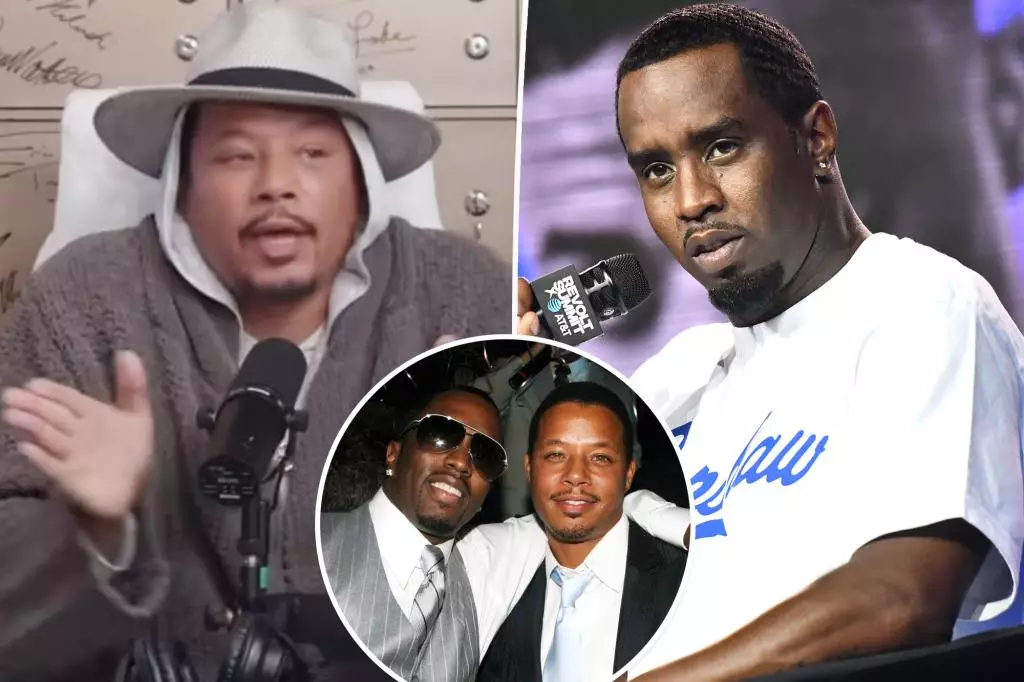In an industry often shrouded in glamor and allure, Terrence Howard’s recent claims against Sean “Diddy” Combs have shone a stark light on the dark undercurrents boiling beneath the surface of celebrity culture. During a candid dialogue on the “PBD Podcast,” Howard painted a troubling picture of his experience with the hip-hop mogul. He revealed that Combs had initially approached him with the seemingly innocuous request to serve as his acting coach. However, as Howard ventured deeper into their sessions, he observed behavior that raised alarms. Rather than engaging in productive mentorship, Combs allegedly spent their meetings in a passive state, merely “sitting and just looking” at him, prompting feelings of confusion and discomfort.
For many, such allegations may seem outrageous, but upon closer inspection, they unveil an unsettling narrative about power dynamics in Hollywood. Howard’s recount entails not just a personal encounter but hints at a larger framework of exploitation prevalent in the entertainment world, where ambitions can become entangled with predatory intentions. The unease surrounding Combs’ alleged behavior raises significant questions about boundaries, consent, and the responsibilities of established figures in the industry.
The Reactions and Ramifications
Howard’s decision to disclose his experience is not just a personal catharsis; it represents an ancestral shift in the narrative surrounding celebrity culture, where silence often prevails over seeking justice. His claims are notably aligned with a growing pattern of accusations surfacing against high-profile figures, including Diddy, who is currently embroiled in an array of sexual assault lawsuits and federal sex trafficking charges. By voicing his suspicions in such a high-profile manner, Howard has joined the chorus of voices seeking to reclaim agency over personal narratives, challenging the status quo that has long allowed male celebrities to behave without accountability.
The implications of Howard’s assertion extend beyond personal boundaries— they transgress into a community discourse about masculinity itself. Howard’s assertion that he has had to confront various industry producers underscores the systemic issue of power plays in Hollywood. By stating, “I don’t compromise. I don’t play gay roles,” Howard is sending a clear message about his identity and the ethical boundaries that guide his career choices. His philosophy on masculinity—and what it means to frame it through personal integrity—echoes deeply in an industry often criticized for its exploitation of vulnerable individuals.
Combs’ Denial and Industry Backlash
In response to Howard’s allegations, Diddy has resolutely denied any wrongdoing, referring to the charges against him as baseless and highlighting the lengths to which individuals will go for fame or financial gain. His legal team has expressed confidence that the truth will emerge during his trial, which is set to begin in May. However, the mere existence of such claims can derail careers, prompt public backlash, and fundamentally alter public perception. In Diddy’s case, it raises the question of whether an established brand, built on decades of artistic contribution, can withstand the sunless storms of public scrutiny.
Furthermore, Howard’s allegations juxtapose against Diddy’s past responses to accusations concerning his professional relationships, where he had previously exhibited intense protective behavior toward family members involved in the industry. When instances arise from insiders that echo Howard’s experience, it solidifies an unsettling landscape where trust is woven through with layers of apprehension and fear. The ripple effect of this may not only redefine Diddy’s legacy but also signal to other celebrities the risks inherent in their personal and professional relationships.
The Larger Narrative of Consent and Empowerment
The narrative surrounding Howard’s claims dovetails into a broader conversation about consent and empowerment within the entertainment sector. In an age where movements like #MeToo have become a clarion call for change, Terence Howard represents a pivotal figure, challenging pervasive structures that perpetuate cycles of abuse and exploitation. His unwillingness to remain silent—despite the potential professional repercussions—demonstrates a courageous commitment to fostering a healthier culture.
It is essential to recognize that Howard’s voice is not simply about his individual experience; it serves as a proxy for many others who may have suffered in silence. The delicate interplay between fame, power, and sexual dynamics in the industry is ripe for examination. Howard’s experience exemplifies a moment in time when longstanding issues can no longer be brushed aside, calling for accountability and a reevaluation of established norms. The ripple effects may offer a renewed hope for those seeking justice, with the rising tide of awareness lifting voices long submerged in the shadows.

